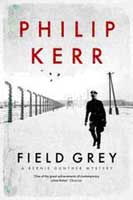
|
|
FIELD GREYPhilip KerrQuercus, Hbk £17.99Released: 4th November 2010Reviewer: L J Hurst |
|
I ended my Shots review
of If The Dead Rise Not, Philip Kerr’s last Bernie Gunther thriller with
these words: “Nevertheless, well worth waiting for must be his next
slice of life, though I wonder who will cut it, where it will be cut,
and how deeply?” Complicated as I knew things must be, I was not
prepared for the complications in Gunther’s life, nor Kerr’s temporal
skills in describing them in his sequel Field Grey. Kerr has made
Gunther’s moral nature more complicated, too. You and I, reader, know that Gunther’s life is lived under an assumed name, because in past books we know that at the end of the war (he’d been a police officer, then a private eye in Berlin, then was taken back into the police before 1939) he was being set up as a patsy by various Nazis who wanted to escape to South America, but that Gunther managed to turn the tables, kill those who would kill him and escaped after adopting their false papers. After all, this series is narrated by Gunther and he has told that himself. Unfortunately, soon after Field Grey begins, when Gunther finds himself in the hands of various war crimes investigators they are not inclined to believe every word he says. Particularly as some of the people who tried to kill him, whom he thought he had left for dead, are still alive and inclined to blame him – missing for many years, don’t forget – in his absence. So, some people are blaming him for massacres in France and Russia during the war; some people are blaming him for collaboration after being taken prisoner by the Russians; and some people might want to punish him for the sins of those who set up his false identity. And some people have memories so long that they wonder why he allowed a communist thug to have gone free back in 1931, before the Nazis even came to power. Most of that, though, counts for nothing because it is 1954, and most things can be forgiven a good German or even a bad Nazi, should they be willing to work for the Allies to oppose the communist threat. There is more to offer such a person should he have friends or even girlfriends behind the Iron Curtain. And such a person, we discover, is Bernie Gunther. Remember, though, that Gunther likes to be no one’s patsy – be it in Reinhardt Heydrich or a handler from the American CIA or the French SDECE. He might supply his detective skills (a murder case in a Prisoner of War camp, or a false identity among prisoners returning from the Soviet Union, along the way here), but he will not sell his soul. He says. Field Grey (the colour of a German soldier’s uniform; Gunther never wore it) plays with time, indicated in the chapter headings, moving between 1931, 1941, 1946 and 1954; the time and events are fragmented, like Nicholas Roeg’s movies Death in Venice and Bad Timing. It is also least like a detective story, and more like John Le Carre. It gripped me, even while I shuddered at what Bernie Gunther’s true nature might be.
|

| Page By Gary Cane [Contact] | ||
| Webmaster: Tony 'Grog' Roberts [Contact] |